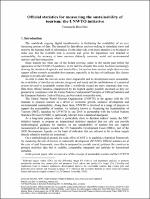Chapter Official statistics for measuring the sustainability of tourism: the UNWTO initiative
| dc.contributor.author | Recchini, Emanuela | |
| dc.date.accessioned | 2023-08-03T15:05:28Z | |
| dc.date.available | 2023-08-03T15:05:28Z | |
| dc.date.issued | 2023 | |
| dc.identifier | ONIX_20230803_9791221501063_77 | |
| dc.identifier.issn | 2704-5846 | |
| dc.identifier.uri | https://library.oapen.org/handle/20.500.12657/74881 | |
| dc.description.abstract | The ongoing digital transformation is facilitating the production, sharing, use and exploitation of an ever increasing amount of data. This phenomenon is stimulating the demand for data-driven decision-making. Regarding tourism, we are moving towards the production of data reflecting a sustainability perspective. The UN World Tourism Organization (UNWTO), in partnership with the UN Statistics Division, launched in 2015 the Measuring the Sustainability of Tourism (MST) initiative aiming at developing an international Statistical Framework (SF-MST) for measuring the role of tourism in sustainable development, including economic, environmental and social dimensions. The ambition is to develop a standardized basis for the collection of relevant information at appropriate spatial scales and the integration of statistics on different domains. For this purpose, the perspective of official statistics, characterized by the highest quality possible inasmuch as they are produced in compliance with the UN Fundamental Principles of Official Statistics and the European Statistics Code of Practice, is followed. SF-MST follows an accounting-based approach and sustainability is envisaged to be evaluated by measuring a broad set of capitals (produced, natural, human and social capital) and the flows of related incomes and benefits. SF-MST builds upon existing internationally agreed statistical standards and guidance in relevant areas: this ensures the adoption of a common statistical language across countries. The linking of the Tourism Satellite Account and the System of Environmental-Economic Accounting, both aligned with the UN System of National Accounts, is a central feature of SF-MST. Despite a standard accounting system is not available for social capital, SF-MST enables the integration of the social dimension of tourism’s sustainability in its own multiple capitals-based approach. SF-MST, involving a wide range of agencies and stakeholders, plays a key role in providing an integrated information basis for derivation of indicators and development of data supporting more effective decision-making towards sustainable outcomes. | |
| dc.language | English | |
| dc.relation.ispartofseries | Proceedings e report | |
| dc.subject.classification | thema EDItEUR::J Society and Social Sciences | en_US |
| dc.subject.other | Sustainable tourism | |
| dc.subject.other | Sustainable development | |
| dc.subject.other | Social sustainability | |
| dc.subject.other | Official statistics | |
| dc.subject.other | Decision-making | |
| dc.title | Chapter Official statistics for measuring the sustainability of tourism: the UNWTO initiative | |
| dc.type | chapter | |
| oapen.identifier.doi | 10.36253/979-12-215-0106-3.09 | |
| oapen.relation.isPublishedBy | 9223d3ac-6fd2-44c9-bb99-5b98ca9d2fad | |
| oapen.relation.isPartOfBook | 863aa499-dbee-4191-9a14-3b5d5ef9e635 | |
| oapen.relation.isbn | 9791221501063 | |
| oapen.series.number | 134 | |
| oapen.pages | 6 | |
| oapen.place.publication | Florence |

